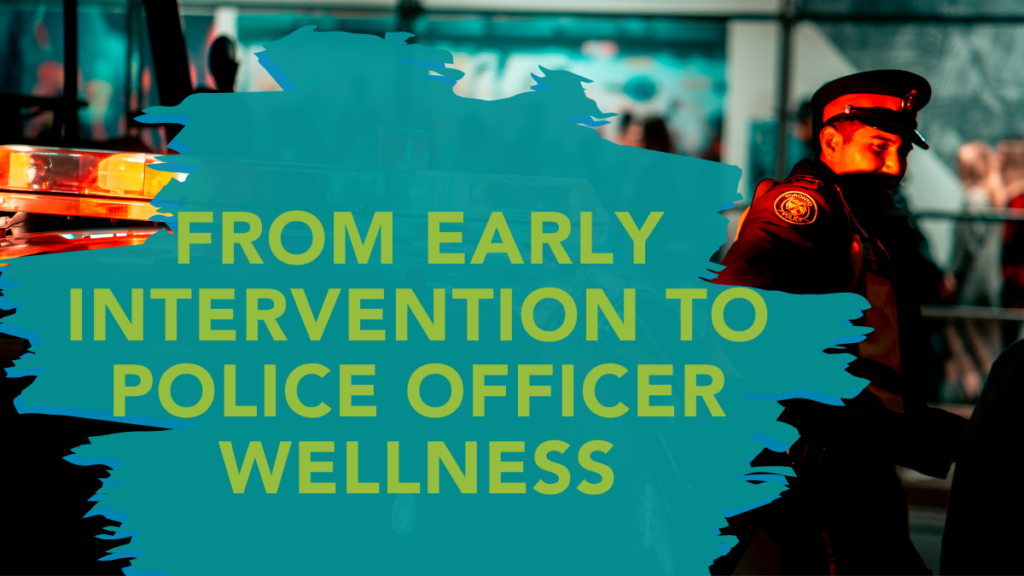Innovative Approaches to Officer Wellness
Posted
October 4, 2021
Share:
The Law Enforcement Mental Health and Wellness Act of 2017 served as an urgent call for more study into mental factors that contribute to officer wellness with the stated goal of producing actionable recommendations for law enforcement leaders. While the bill’s title suggests a somewhat narrow focus on mental health, the reality is that factors contributing to mental health among law enforcement officers span numerous interconnected areas of study. Researchers’ exploration of the subject has produced data vital to law enforcement leaders in their efforts to create innovative programs to promote officer wellness.
In our last post, we looked at some of the programs already in place at departments throughout the country. Many large, well-resourced departments have had employee assistance programs (EAP) in place for decades and continue to evolve them as emerging research sheds new light on how to best support officers in their careers. These programs have historically focused on counseling and peer-mentorship, demonstrating efficacy in improving officers’ working conditions.
 As research drives an increased emphasis on holistically supporting an officer’s wellness, new plans are being put into practice to work towards these aims. Some of the ideas may be surprising to outside observers in that they tackle causes of stress not typically addressed by traditional officer assistance programs. Among the more promising new tactics are programs designed to address underlying causes of job stress in officers: their physical fitness and financial health.
As research drives an increased emphasis on holistically supporting an officer’s wellness, new plans are being put into practice to work towards these aims. Some of the ideas may be surprising to outside observers in that they tackle causes of stress not typically addressed by traditional officer assistance programs. Among the more promising new tactics are programs designed to address underlying causes of job stress in officers: their physical fitness and financial health.
Financial Wellness
Stress about one’s personal or family finances is hardly unique to law enforcement officers. According to a wide-ranging study on financial health, 53% of respondents reported that simply thinking about their finances makes them anxious. That statistic jumps to as high as 63% in participants 18-35 years old, indicating the increased financial stress younger workers experience. Stress about debts and income is known to increase the chances of a person developing significant anxiety, depression, and other mental health issues.
Research published in the Journal of Police and Criminal Psychology suggests law enforcement officers may feel financial stress to an even greater degree than the general public. The study, published in 2020, surveyed causes of stress among 427 Illinois law enforcement officers. The data showed that concern about financial issues was a top cause of officer stress, with more than 72% of them reporting it as a significant factor, surpassing concerns about supervisor relationships or witnessing traumatic events while on duty. Reducing these financial worries is “extremely important” in reducing the overall stress that officers experience due to their work.
Lack of access to financial counseling services can be a real hindrance to financial health for officers whose salaries and wealth holdings might not reach the typical thresholds necessary to retain the services of a traditional wealth planner. Agencies like the Charlotte-Mecklenburg Police Department have included financial counseling as a part of their EAP. The department facilitates peer-led groups that cover financial wellness as a component of their broader wellness curriculum. Furthermore, the department has, on several occasions, funded one-on-one visits from a financial planning consultant. Initially, the program was so popular that departmental leaders immediately scheduled extra sessions and follow-up meetings to satisfy robust demand from officers. Informational sessions and resources are also offered to retired officers to help them manage their finances post-employment.
Physical Wellness
Though there is a substantial physical component to the job for most officers, according to the International Association of Chiefs of Police (IACP), only slightly more than half of them participate in any type of fitness regimen. Officers who do not keep a regular fitness routine were found in this IACP study to report more frequent issues with on-the-job injuries and to miss more shifts for post-injury rehabilitation. Missed shifts and opportunities for overtime can compound financial stress and strain on-the-job relationships, creating a domino effect of stressors.
Physical fitness among officers plays a more vital role in wellness than simply preventing injuries and missed shifts. Researchers and health professionals have documented a strong link between mental and physical health. Regular exercise is shown to reduce stress, improve mood, and enhance one’s resilience to mental health issues like anxiety and depression.
The Bend Police Department (BPD) has shown itself as willing to challenge law enforcement conventions to serve the goal of bettering officer wellness. Department leaders switched to a “three days on, four days off” schedule with 11.25-hour shifts in response to research suggesting that this rotation schedule is less disruptive to sleep cycles. The same study found that almost half of officers had reported falling asleep at the wheel, indicating the clear danger sleep deprivation poses to the officers themselves and the communities they serve.
The BPD also employs a unique set of mindfulness and yoga programs to create holistic improvements in officers’ overall wellness. These programs are, without a doubt, somewhat atypical for a law enforcement agency but have seen increasing buy-in from once-skeptical departmental leaders and officers. Daily mindfulness sessions are peer-led and involve meditation designed to facilitate stress reduction. After initial hesitancy, department leadership estimates as many as 75% of officers now participate in these sessions.
“As an officer, you feel like you never have time to shut off. The training helped me learn how to do that, even if it’s just during the ride home from work.” – Corporal Erick Supplee, BPD Law Enforcement Mental Health and Wellness Programs: Eleven Case Studies
BPD’s yoga program focuses on flexibility and stress reduction as its core tenants. Critical to the program’s success, and a key recommendation for departments considering replicating it is finding an instructor able to demonstrate a commitment to understanding the specific needs of law enforcement officers and, most importantly, the culture of BPD and policing in general. Participation is voluntary, and as more officers give the program a chance, they’ve dispelled their preconceived notions about what yoga is about and who it is for. The program is seen as a success, contributing to a 40% reduction in job-related injuries. Owing to that success, yoga instruction has been renewed by the department through 2021.
A Complete Picture
As the understanding of officer wellness grows, aided by scientific research and study, so do departmental leaders’ approaches to supporting programs to enhance officer health. The products of researchers’ work consistently show officer wellness as impacted by a complex set of intersecting stresses, professional and personal needs. No single assistance program will produce dramatic improvements in overall wellness outcomes. Innovative methods like these, working in conjunction with well-established wellness-enhancing programs, show real promise as 21st-century solutions to persistent challenges to officer wellness.
Related Posts
Ready to Experience the Benchmark Difference?
Benchmark Analytics and its powerful suite of solutions can help you turn your agency’s challenges into opportunities. Get in touch with our expert team today.



